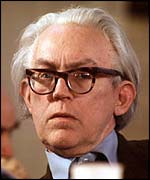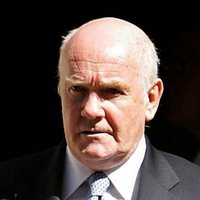
There are two recurring themes I have noticed in recent blog postings about the Labour leadership contest. Firstly, the unfavourable comparisons that have been made between the current crop of contenders and the stellar line-up in the race to succeed Harold Wilson in 1976, and secondly, the related issue of the current lack of a recognised leader of the left.
As Mike Smithson pointed out on
PoliticalBetting.com today, the '74-76 Wilson Government contained an extraordinary concentration of political talent, with no fewer than six Cabinet "big beasts" putting themselves forward for the leadership.
They included both Michael Foot and Tony Benn from the left of the party - two acknowledged giants besides whom the current-day lefty hopefuls Michael Meacher and John McDonnell are mere political pygmies.
So is it because the left has been effectively marginalised under the current leadership - "Exit Hard Left Pursued By Blair" as one memorable newspaper headline put it a few years back? Or has the left just been desperately unlucky in that all those who might have become its standard-bearers have, in some way or another, fallen by the wayside?
I would contend that, by and large, it's the latter. While Mr Blair clearly does have a very different attitude to party management to Mr Wilson, preferring to lead from the front rather than trying to hold warring party factions together, I do not think he would have excluded the likes of Robin Cook or Clare Short from his Cabinet had they not decided to exclude themselves.
Either of Cook or Short could have gone on to establish themselves as the leader of the anti-war left, and thereby become a significant player in the forthcoming contest. But Cook sadly died, while Short threw away her position by her increasingly bizarre behaviour.
But if Gordon Brown's chances have been boosted by the lack of an obvious rival from the left, he has been even more fortunate in the trials and tribulations that have befallen his potential opponents on the right of the party.
If Alan Milburn had lived up to his early promise and not flounced out of government twice, if David Blunkett hadn't self-destructed after straying too far from his working-class roots, if Charles Clarke had developed some political finesse to go with his undoubted ability....then Brown might now be facing a much stiffer fight.
The 1976 contest was of course won by the centrist figure of James Callaghan after the two wings of the party cancelled eachother out. In particular, he benefited from the divisions between Roy Jenkins, Denis Healey and Tony Crosland, the Gaitskellite
Friends and Rivals who could not agree which of them would be the candidate.
What today's Labour Party really lacks is not so much a Foot as a Crosland, someone who can provide some sort of intellectual framework for a left-of-centre government in the early 21st century. David Miliband probably comes closest - but he is one for next time round.

 There has been much speculation in the blogosphere over recent days concerning John Reid's intentions towards the Labour leadership, for instance:
There has been much speculation in the blogosphere over recent days concerning John Reid's intentions towards the Labour leadership, for instance:
